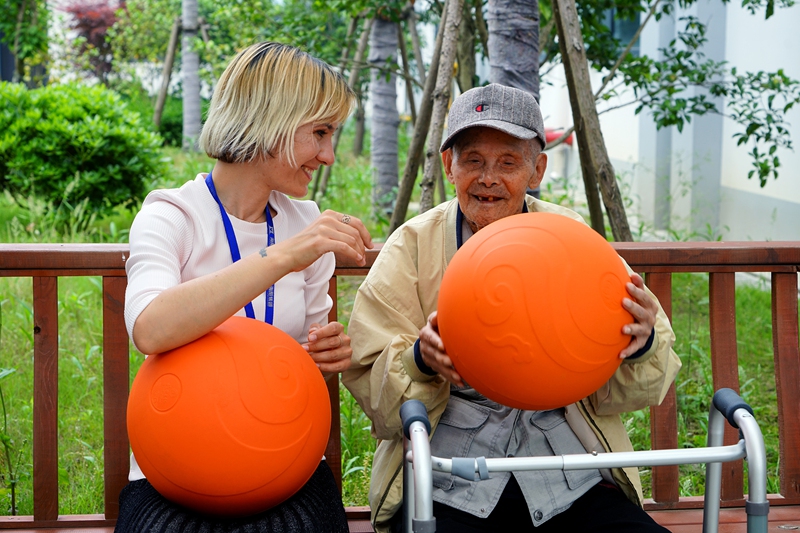CHINA / PROFILE
Parenting beyond age: Latvian lady tends over 200 elderly residents in a Shanghai retirement home

Anastasija Puzankova plays a game with a grandpa living in the retirement home in Shanghai. Photo: Chen Xia/GT
Anastasija Puzankova, a 35-year-old Latvian, who deems herself as the mother of 212 elderly residents, is capturing hearts at the Jiufeng Senior Home in Qingpu district's Liantang ancient town in Shanghai.
For her role as the director of this old-age home, she spends nearly two hours every day, commuting by subway and bus to, reach her workplace; she has no qualms.
With the coronavirus pandemic raging across the world, that claimed over 320,000 lives globally, the elderly population has visibly emerged as the susceptible group. Some nursing homes in the West are reportedly worst-affected by the coronavirus.
In the face of the pandemic, ensuring the mental and physical safety of the elderly was a mammoth task and, at the same time challenging for Puzankova and her colleagues. And, they visibly succeeded, as this elderly home reported zero infections during the outbreak.
Cheer up the elderly
The Ministry of Civil Affairs had urged all nursing homes in China to adopt the enclosed management and issued a guideline in February with detailed instructions, including entry and exit control for elderly people in nursing homes.
Puzankova and her colleagues strictly followed the government instructions such as wearing masks, disinfecting material surfaces and outdoor environment, etc. However, she faced problems in purchasing some vital medical supplies like masks and disinfectants. She reported it to the local government, and it was solved within a week. "We are very grateful for that," Puzankova told the Global Times.
All the residents are under lockdown management for their safety. The entire 60-strong office staff were living at the center to reduce risks of infection and provide 24-hour services to the elderly members.
They spent time with one-on-one activities such as reading articles, chatting, and painting during the epidemic outbreak to ensure the elderly members are not engulfed by anxiety. "Some elderly got really upset and depressed," Puzankova said, noting that the nursing home visits and major activities were stopped during this period.
There's a differently-abled lady who has difficulty in sitting in a wheelchair. To relieve her depression, Puzankova bought a lot of different puzzles and spent time solving them together.
Unlike young people, elderly residents don't know how to use a cell phone to communicate with the outside; the caregivers help them to make video calls with their family to cheer them up.
It has never been an easy job to take care of the elderly. Over 2 million elderly people live in around 40,000 nursing homes across China, with around 370,000 workers, among whom only 200,000 are caregivers, Yu Jianliang, an official from the Ministry of Civil Affairs said during a press conference on March 9.
A caregiver needs to serve around ten elderly people on an average, nationally, Yu added, noting that the country has long grappled with a shortage of nursing care staff before the outbreak.
Puzankova also faced a shortage of caregivers after the nursing home was locked down, as some of the caregivers couldn't return to work due to the epidemic. Thanks to the support of all the staff, including the security guards and herself, as all served as caregivers to help those elderly in need. As some elderly went out to the hospital during the epidemic, they had to be quarantined for 14 days in a designated area, with fixed caregivers at their service.
Being a mother
The center also has a 94-year-old grandma who mostly keeps herself confined to the living room; Puzankova tries to take her out on the wheels to let her feel the fresh air and touch the leaves every day. "I like her (Puzankova) very much," grandma said. To keep her engaged, Puzankova would ask the lady to guess the leaves' color. Puzankova would shower praises when she replied. The grandma laughed happily.
After coming as an exchange student to study law at the Fudan University, thereafter, working in the white-collar sector in Shanghai, Puzankova has been living in Shanghai for 16 years. She speaks fluent Putonghua.
"You are not allowed to smoke." "I will take you out for a walk soon." "I will bring you delicious food later." These are Puzankova's daily conversations with the elderly members of the care home. A 96-year-old grandma told the Global Times that Puzankova is her "good friend."
Puzankova was surprised when she first came to the old age home center, as she didn't expect the residents, with an average age of over 85, to be so healthy and active. "To be their mom," she said with a smile, expressing her happiness as the residents share both good or bad news with her.
Fan Zhida, a 97-year-old resident living in the center, wrote, "Life in the nursing home is sweet, healthy for 100 years."
